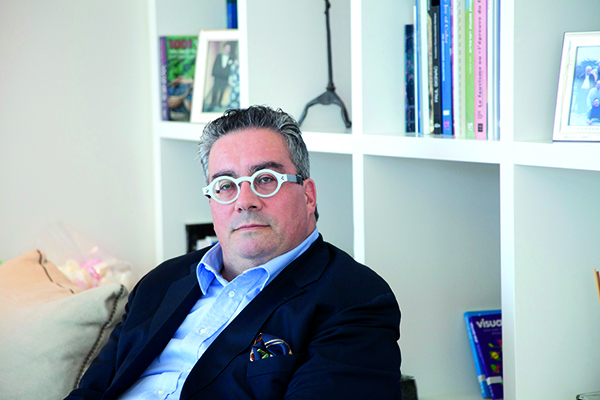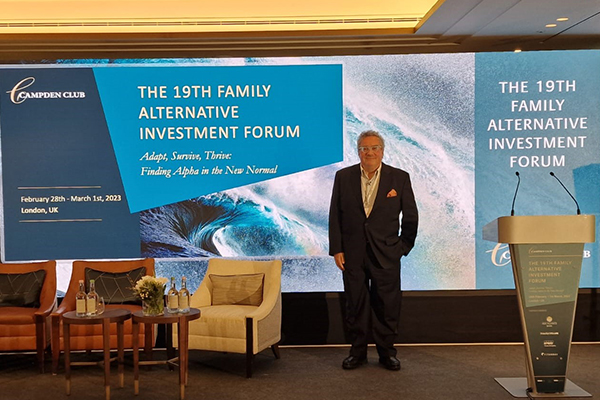Philippe J. Weil: 'The complexity of being born into wealth'

An experienced fourth-generation family member who has the passion and drive of a first-generation founder, Philippe J. Weil is a man of unique insight and knowhow.
Coming from a Swiss Jewish family that has traded in one form or another for more than 400 years, his great grandfather on his father’s side made a splash in the textiles industry before the family diversified into commodity trading and residential real estate.
Having personally had more than 30 years of experience in the financial services industry – working with such industry luminaries as Julius Baer, JP Morgan, Republic National Bank of NY and Union Bank of Israel – in 2001, Philippe founded P.J. Weil Ltd, a private multi-family office with a focus on family governance.
“Because of a combination of Jewish values and Swiss conservatism, ostentatious showing of wealth doesn’t impress me,” he says of his approach to wealth holding. “I like the phrase ‘Quiet luxury’, where you have the best quality of something but it doesn’t have a brand name all over it.

“I like beautiful things – I have an art collection and I like to collect watches – but I can also stay at a small inn and drive my 11-year-old Land Cruiser. I do not "have" to have things because society expects a person in my socio-economic group to do so. What defines me is to be a good person and for my children to be the same. We were born into this privilege and that comes with obligations. Philanthropy is an important value for my family, giving back, not only with money, but also with being involved with charitable causes is our way to share some of the good fortune we have.
“This is also the approach I have when I talk to clients. I see the complexity of being born into wealth.”
Having spent decades successfully helping families of wealth to protect their heritage and manage their future, Weil has learned that clear communication is the best tactic for continued success. So, here in his own words, he talks about effective governance advice and the importance of listening to every generation…
FIRST, DEFINE WHY FAMILIES SHOULD TALK TO YOU…
I have the freedom to be truthful with my advice… I worked with the single-family office of a multi-billion-dollar family and helped them to combine a variety of revenues into a single stream having brought on board all the directors and the lawyers to get the job done.
I did the job I was hired to do and was prepared to move on but, because I could walk away, the principal came back to us and said, ‘Now that everything’s together, would you audit my family office?’ I had earned a reputation for being professional, independent and not reliant on their purse strings to survive and that led to repeat business.
A GOOD ADVISOR GIVES THE FAMILY WHAT THEY NEED, NOT WHAT THEY WANT…
If you ask an architect to build a house, he will do the job the way he understands… As a result, you could have a home built out of Carrara marble when you are into French Rococo.
If you don't tell your architect what you actually want, you won’t get it. But on the other side, you need to trust that the architect also knows what he’s talking about!

It’s the same when someone says to me, ‘I need a family office’ or ‘I need an educational program for the next generation’, for example.
First, I need to understand your family and discover if there are any elephants in the room. For example, I have a client who said ‘My daughter is not happy with my plan of transitioning the business. Can you talk to her?’
I said, ‘Yes, I can talk to your daughter. But that won't be enough… I have to talk to you first.’ And then, only once everyone has had their say, will we find out if you’re making a mistake.
My job is to put a mirror up and say, ‘You see the problem being your daughter, but actually, the problem is that you are not listening to the needs of your family’… I'm here to help you look at the needs, not the want.
UNDERSTAND THE VALUES OF DIFFERING OUTLOOKS…
The success rate of transferring wealth effectively beyond the third generation is only 9%. Why does the third generation struggle so much with retaining and growing the wealth?
A lot of this can be put down to sibling relationships – even those born just a few years apart can have a significant difference in values and outlook.
I have a client family where one sibling wants to leverage to the ceiling and embrace full risk, and another was super concerned about making any changes. The key for them was to find middle ground, understand what was at stake from all angles and to accept that it’s much more worthwhile for all of them to be working together.
I was born in 1967 and my sister was born in 1958, so she grew up in a completely different home to the one I grew up in. When she was little, my father ran a textile business and went to work in a factory every day. In the early 1970’s, he had to shut down the business and the family went through a rough period. When I was ten years old, my father landed a great job with an American Commodity Broker and he had an international career – so there was much more money, and we went to fancy restaurants and on vacation more often. We both had very different experiences of what was ‘normal’ and we have had to respect each other’s values and experiences.
Now, cousins might have an age difference of up to 40 years and there could be a much wider difference between value sets. So, they should work harder to respect each other’s opinion. If they can’t, how can they be expected to run a business together?

In most cases of ultra-high-net-worth families, the grandparents started the business and learned everything from experience, blue collar-style.
Because the first generation was successful, the second generation is able to have a good education. If they want to carry the business forward, they will study economics or accounting or law. As a result of that education, they’ll likely go to the parents and say ‘What you’re doing is wrong, we have to do it this way…’
If the first generation is smart enough, they’ll understand that a transition is happening and they learn to adapt to a different way of thinking.
The third generation’s job is to say, ‘Grandpa and Grandma, don't worry, we'll take over and we’ll honour this family legacy you’ve built,’ while also developing and growing the reputation established by the second generation. If that continues, then you have a family story and then you can start to actually build a dynasty business… The third generation’s job is to build that dynasty.
SUCCESSFUL WEALTH TRANSITION IS ALL ABOUT OPEN COMMUNICATION…
Research shows that the biggest reasons why family businesses don’t survive past the third generation is lack of communication. So, when we talk about governance, open communication is key.
If one child gets a gift from a parent or you think another is the right person to run the business for the next generation, but you’ve not been open and clear to the whole family about that decision-making process, that will come back to haunt you.
Every family member is equally valuable in their own way and my job is to sit down with the families and find those diamonds in the rough and discover what they can do for the family, whether that’s working in the family business, being involved with the family’s charitable foundation or taking care of the trust. Open communication can clarify each other’s potential and ensure the strength of the family.
THE OPINION OF THE NEXT GEN IS JUST AS IMPORTANT AS THE PREVIOUS GENERATION…
The Campden Wealth European Family Office Report 2022 found that significant numbers of European family offices report that the next generation is too young or inadequately qualified to take over and that’s something to watch out for.
When I started as a young bank clerk, I rarely saw the light of the day because I had to work from very early in the morning until late at night. It was a tough job, but that’s what the way we learned the profession back then. Today, Generation Z gets a job in Google and, after three months, are in a position to talk to the CEO and share their ‘experience’… It sounds crazy but, actually, sometimes something good can come out of this.
The world has changed and we have to adapt. It’s not that the Next Gen are too young, it's that we don’t understand that they might do things differently.

I recently had dinner with two siblings, who are now running the non-business part of the family office of a leading German industrial family. They’re in their 20s, not long out of university and they came to look at high-tech investments in Israel.
Why were they qualified to look at such important investments for their family? They are internet savvy, they understand technology, they’re part of the family business environment… So why shouldn't they take some responsibility?
Family members with a particular skillset and outlook are important, you just have to know how to integrate them.
In some ways, I share the concern of the European family offices about the transition to the next generation, but on the other hand we have learned that young people have ideas which can be successful – just look at all the high-tech tycoons who have made their first billion before the age of 30. We should be opening our eyes and seeing that this next generation has a lot to offer.
THE OUTSIDE WORLD IS AN IMPORTANT EDUCATION TOOL FOR THE INCOMING GENERATION…
The Campden Wealth European Family Office Report 2022 also found that while family offices and family businesses can be a useful training ground for Next Gens’ educational development, 64% of European families expect them to gain work experience elsewhere, such as at a bank or hedge fund, before joining the family firm… This is something that I fundamentally agree with.
If you have a huge operating business and you have divisions all over the world, it might be okay to send your kids off to work in one or other branches of the business. But, in normal circumstances, I think it's much better to put your kid to work with the competition.
I had a wonderful conversation with a gentleman from the north of Israel. He said, ‘You know, I'm in this business and my daughter just finished her studies in the same field of interest, so I plan to give her a job at my office.’
I said he’d just made the biggest mistake… If she arrives at work at 9.30am instead of 9am, no one will tell her that it's not okay. And if she has a project that she doesn’t finish on time, no one will tell her it’s not okay, because she’s the daughter of the boss.
But if you find her a job with one of your competitors or colleagues, she’s just a new employee and she will learn the importance of being on time and finishing her projects. She will be better at her job and, when she does eventually join the family business, she’ll be a much stronger asset for you.






